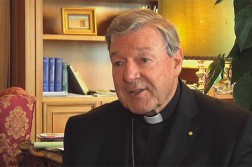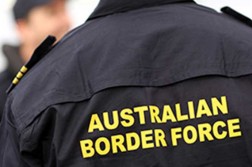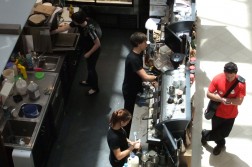And so another year passes into the boring mists of history. And what a year it was. As momentous events shook our world, mighty forces shaped our destiny, and vaguely interesting people did certain things, we sat spellbound, watching Dancing With The Stars and binge-drinking in blissful ignorance.
However, as happy as we’ve been knowing nothing about the world this year, sooner or later, the dark angel of knowledge eventually comes to poison us all, and we must all learn something about the big issues, if only to avoid looking stupid the next time you’re at one of those parties where horrible people drink wine and bitch about the Government.
That’s where a "year in review" article can come in so very handy, both for the reader who wants a quick refresher on the hard-to-remember major events of the past year, and for the writer who wants an efficient way to fill up his last column of the year without having to think of anything new. And so, as the great god Janus casts his eyes upon our journey from one year to the next, let us make a brief swoop over the landscape of 2008:
What were the highlights? Early on in the year we had Kevin Rudd’s long-awaited apology to the Stolen Generations, an historic and emotional event that united all Australians in a wondrous outpouring of pride, sorrow, joy, grief and relief. Apart from Herald Sun columnist Andrew Bolt, who demanded Stolen Generation propagandist name just 10 Aboriginal children who were removed just for being Aboriginal, and went on to show, via graphs, how Lowitja O’Donoghue caused global warming.
Of course, he wasn’t alone. Many people pointed out that none of the Aboriginal people they knew wanted an apology. In fact, their Indigenous friends found the entire thing distasteful. Many of these people also had best friends who are gay. Nevertheless, it was a heartwarming moment, and just the beginning of the Government’s concerted efforts to address the plight of Indigenous people. These have been so successful that today, just 10 short months later, I don’t even know what they are.
That wasn’t the Rudd government’s only "big thing" this year. There was also the 2020 Summit, a magnificent event in which brilliant minds and high achievers from all around the country gathered in Canberra to eat bagged lunches and scribble on butcher’s paper. The Summit was designed to provide ideas for dealing with the pressing issues of the day, and it lived up its promise, the intellectual pot bubbling over with a hearty brain-casserole full of innovative concepts like doing something about climate change, giving money to artists, and the bionic eye.
Despite the terrifying implications that this last raises for the eventual apocalyptic conquest of the human race, the Summit was one of the greatest government initiatives in history, as measured in total volume of photographs of Cate Blanchett’s babies — something noticeably missing from the Hawke-Keating economic reforms, or John Curtin’s recall of Australian troops.
Of course there were the naysayers, who claimed in their mentally deficient way that the Summit was nothing more than an empty PR exercise with no lasting benefits and no point beyond the self-aggrandisement of Kevin Rudd. These are the same people who bring us all down by pointing out that no good countries are in the Commonwealth Games. The only pity is that nobody at 2020 came up with the idea of targeted sterilisations.
Which brings us to the Olympics, which in 2008 took place in Beijing, China’s Party Town. The Games were a triumph for Australia, which basked in the glory of sporting giants like Stephanie "Tired Pun" Rice, who won over 30 gold medals by herself and somehow convinced millions that she was extremely attractive; Matthew Mitcham, who showed the world that despite bigoted stereotypes, a gay man can fall into water; and Tamsyn Lewis, who failed to make the final and cried like the pathetic cowardly loser we’ve come to know and love. And from outside Australia, there was Michael Phelps, who won so many medals that if he were his own country, China would have occupied him and brutalised his indigenous people.
Meanwhile, back home, Australian Catholics had their own "Olympics", World Youth Day 2008. Unlike the regular Olympics, however, instead of an opening ceremony, WYD had the Stations of the Cross; instead of gold medals, it had Bibles; and instead of Michael Phelps, it had Guy Sebastian. Good Christian youth from around the world flocked to Sydney to celebrate, pray, and engage in furious intellectual debates about whether Jesus was super-awesome, or just the coolest. The mood of love and harmony was so pervasive the occasion was not spoiled even by the sinister elderly German man who was spotted loitering amid the young people.
Of course WYD had its knockers, those who criticised the disruption and the undemocratic new police powers and the horrible music, while Herald Sun columnist Andrew Bolt demanded that Catholics name just 10 children who were crucified just for being the son of God.
And of course, World Youth Day leads us to God’s biggest project of 2008, the global financial crisis. Bankers and financiers around the world were shocked this year when they discovered that, contrary to all accepted economic theory, people with no money sometimes fail to pay their debts. As banks fell and governments scrambled to limit the fallout, the public struggled to come to terms with the natural disillusion that comes with realising that rich people are, to a certain extent, scum. Public debate raged over just who was to blame for the crisis; Julie Bishop gained some support for her theory that it was caused by Wayne Swan, until it was discovered that she had actually copied the bulk of it from an earlier theory about who caused the Challenger disaster (also Wayne Swan).
Late in the year, the world underwent a massive upheaval with the election of a new US president in Senator Barack Obama, who became the first black man to rise to such a position, finally bringing the US into line with other progressive countries like Australia, which has a proud history of black prime ministers stretching back to Alfred Deakin. The election was characterised by both lofty rhetoric and bitter hostility, as Obama’s message of hope and renewal clashed violently with his opponent John McCain’s more pragmatic policy of being an irritable old man, and Sarah Palin’s frequent shooting sprees. In the end, of course, hope won out, and we look forward to the new mood of optimism infusing the globe for anything up to the next four or five months.
The issue hovering like a malevolent vulture over the rotting zebra of 2008 was of course climate change. This vexed issue was only made more problematic by the fierce debate going on within the scientific community, which remains divided between those scientists who claim that catastrophic anthropogenic climate change is an imminent global menace, and those scientists who claim that they are, honest to God, actual real scientists. The climate sceptics decry the whole idea of taking action on climate change, led by experienced climatological researchers like Herald Sun columnist Andrew Bolt, who points out that not only is the globe not warming, it’s actually 10 degrees colder than it was six months ago, and even if the globe were warming, it’s not because of any of the clean, life-giving carbon dioxide in the air, and it’s not fair that he’s not allowed to water his garden, and can anyone name just 10 children who are warmer just because of greenhouse gases?
As the most pressing issue of the year, it was both apt and gratifying that the year ended with the Rudd Government finally taking decisive action with its carbon pollution reduction scheme. Onerous conditions have been placed upon major emitters, forcing them to fill in the necessary paperwork to receive their free carbon permits. In this way and others, the Government hopes to achieve a 5 per cent cut in 2000 levels by 2020, a target that should be easily achieved once we have eliminated the pollution produced by the manufacture of tourist brochures for the Great Barrier Reef.
And so, with Kevin Rudd continuing to show the boldness of action and breadth of vision that has epitomised his leadership ever since that thrilling day when he went before the nation and declared that he would turn gay for his wife, the year drew to a close.
It was a good year, a solid year. Perhaps not quite up to the standards of, say, 1957 or 1745, but a good year nonetheless, full of drama and intrigue and half-witted letters to the editor. And what have we learnt from the year? We have learnt that capitalism is not perfect. We have learnt that we cannot keep on abusing our planet as if there were no consequences. We have learnt that there is hope for the future, in men and women willing to look beyond old prejudices and outdated methods of operation. We have learnt that Brendan Nelson is so inconsequential he’s not even worth mentioning in a review of the year.
Most of all, we have learnt that, no matter whether it’s the financial crisis, or the climate crisis, or the binge-drinking crisis, or the education crisis, one thing is for certain: we are all doomed.
So as we contemplate the ever-worsening condition of our blighted and hopeless lives, and the inevitable horrific deaths that await us all at the hands of economic destitution or rising sea levels, leaving our children to inhabit a nightmarish wasteland of starvation and shattered dreams, let’s take a moment to think of the good things in life.
OK, I’m done.
Merry Christmas. See you in 2009.
Donate To New Matilda
New Matilda is a small, independent media outlet. We survive through reader contributions, and never losing a lawsuit. If you got something from this article, giving something back helps us to continue speaking truth to power. Every little bit counts.



